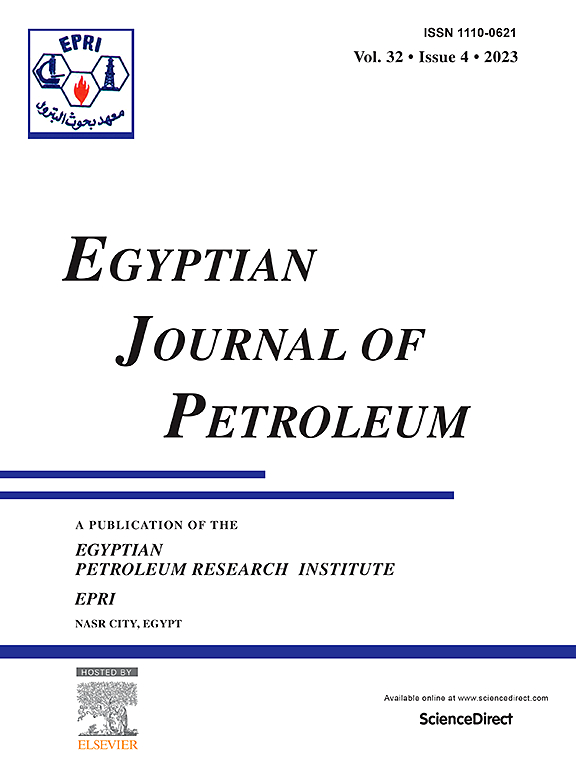Impact of the functionalization of Janus MnO2 nanomaterials on the kinetic of the catalytic asphaltene oxidation.
Q1 Earth and Planetary Sciences
引用次数: 0
Abstract
Due to the increasing energy demand and the depletion of light crude oil, the exploitation of heavy crude oil fi elds is being considered as an alternative. In-situ combustion is an enhanced oil recovery thermal technique that involves injecting air or oxygen into the well to promote partial oxidation of the oil. However, the initial ignition of combustion has posed signi fi cant challenges. Therefore, special attention must be given to low-temperature oxidation. Furthermore, asphaltenes contribute to coke formation as a fuel. Janus nanomaterials catalysts can be utilized to lower the ignition temperature. In this study, we focused on investigating the catalytic oxidation of asphaltenes primarily in the low-temperature oxidation region. To achieve the research objective, the catalytic oxidation of asphaltenes was studied using janus-functionalized MnO 2 nanoparticles that were previously synthesized and characterized using both adipic and hexanoic acid. It was observed that surface functionalization reduces the exothermic nature of the process, and the apparent activation energies for the functionalized materials are lower than those for the virgin asphaltenes and the obtained MnO 2 , thus demonstrating their catalytic activity. Additionally, the stability of the formed nano fl uids is maintained for up to 24 h.Janus MnO2 纳米材料的功能化对沥青烯催化氧化动力学的影响。
由于能源需求的不断增长和轻质原油的枯竭,人们正在考虑将重质原油的开采作为一种替代方法。原地燃烧是一种提高石油采收率的热能技术,通过向油井注入空气或氧气来促进石油的部分氧化。然而,燃烧的初始点火带来了巨大的挑战。因此,必须特别注意低温氧化。此外,沥青质作为燃料会导致焦炭的形成。Janus 纳米材料催化剂可用于降低点火温度。在本研究中,我们主要研究了沥青质在低温氧化区的催化氧化。为了实现研究目标,我们使用之前用己二酸和己酸合成并表征的 janus 功能化 MnO 2 纳米粒子研究了沥青烯的催化氧化。研究发现,表面官能化降低了过程的放热性,官能化材料的表观活化能低于原始沥青烯和获得的 MnO 2,从而证明了它们的催化活性。此外,所形成的纳米液体的稳定性可维持长达 24 小时。
本文章由计算机程序翻译,如有差异,请以英文原文为准。
求助全文
约1分钟内获得全文
求助全文
来源期刊

Egyptian Journal of Petroleum
Earth and Planetary Sciences-Geochemistry and Petrology
CiteScore
7.70
自引率
0.00%
发文量
29
审稿时长
84 days
期刊介绍:
Egyptian Journal of Petroleum is addressed to the fields of crude oil, natural gas, energy and related subjects. Its objective is to serve as a forum for research and development covering the following areas: • Sedimentation and petroleum exploration. • Production. • Analysis and testing. • Chemistry and technology of petroleum and natural gas. • Refining and processing. • Catalysis. • Applications and petrochemicals. It also publishes original research papers and reviews in areas relating to synthetic fuels and lubricants - pollution - corrosion - alternate sources of energy - gasification, liquefaction and geology of coal - tar sands and oil shale - biomass as a source of renewable energy. To meet with these requirements the Egyptian Journal of Petroleum welcomes manuscripts and review papers reporting on the state-of-the-art in the aforementioned topics. The Egyptian Journal of Petroleum is also willing to publish the proceedings of petroleum and energy related conferences in a single volume form.
 求助内容:
求助内容: 应助结果提醒方式:
应助结果提醒方式:


